By Sean Bristol-Lee, D.P.T.; Edited by Elizabeth Fine
 WiRED International just added a cutting-edge tool to our Community Health Worker (CHW) program’s Health Module Access Program (HealthMAP). Now, the continuing medical education (CME) tracker will enable CHWs, via WiRED’s Android app, to
WiRED International just added a cutting-edge tool to our Community Health Worker (CHW) program’s Health Module Access Program (HealthMAP). Now, the continuing medical education (CME) tracker will enable CHWs, via WiRED’s Android app, to
- download and study 400+ health education modules,
- complete their CHW training online,
- expand their medical knowledge and skills,
- record their required credits to maintain certification and prepare for disease outbreaks.
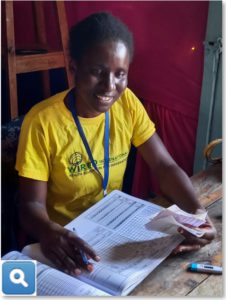 Earlier this year, WiRED launched a major update to its breakthrough mobile app, HealthMAP, revolutionizing healthcare training for low-resource communities worldwide. Capable of delivering hundreds of peer-reviewed healthcare training modules, HealthMAP provides free, life-saving education to the general public while also serving as a crucial training tool for WiRED’s CHWs.
Earlier this year, WiRED launched a major update to its breakthrough mobile app, HealthMAP, revolutionizing healthcare training for low-resource communities worldwide. Capable of delivering hundreds of peer-reviewed healthcare training modules, HealthMAP provides free, life-saving education to the general public while also serving as a crucial training tool for WiRED’s CHWs.
CME for CHWs: A Model for Excellence
Doctors and nurses are required to earn CME credits annually to stay up to date with medical advancements, maintain their skills and provide quality patient care. WiRED’s CHW CME program adopts this proven model to ensure that CHWs remain well-trained and prepared for emerging health challenges.
Designed specifically for under-resourced regions, WiRED’s CME program is:
- Completely Free: No financial burden is placed on CHWs or the communities they serve,
- Built into HealthMAP: CHWs can complete their training directly within the app and
- Offline Accessibility: Learning continues even where Internet connectivity is scarce as CHWs can download the training modules to their phones for offline study.
How the CME Program Works
The process is simple and effective:
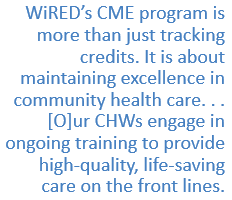 Access HealthMAP Modules: Any CHW, not just those trained by WiRED, can explore WiRED’s free health modules.
Access HealthMAP Modules: Any CHW, not just those trained by WiRED, can explore WiRED’s free health modules.- Take the Final Quiz: Each module concludes with a comprehensive quiz to reinforce learning.
- Submit Results for CME Credit: With the click of a button, the CHWs can record their final quiz score in their password-protected online database.
- Track Progress: Users can monitor their CME credits to see which modules they have completed, their total points earned for the year and how many more credits they need before year’s end to meet their quota.
CHWs are required to complete a minimum number of CME credits annually to maintain their certification in good standing. This structured approach ensures continued competency while allowing flexibility for CHWs to specialize in topics most relevant to their communities. At present, they can choose from among 400 modules, with new topics always being added to address local health issues and emerging diseases.
Specialization and Dynamic Learning
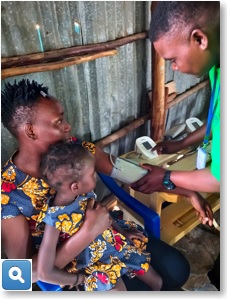 Beyond maintaining certification, the CME program empowers CHWs to specialize in healthcare topics that matter most to their communities. CHWs often work together in teams, and a team of unique specialists can provide more individualized and nuanced care. For example, a pregnant woman can be served by a CHW who focused her CME credits on mother and child health.
Beyond maintaining certification, the CME program empowers CHWs to specialize in healthcare topics that matter most to their communities. CHWs often work together in teams, and a team of unique specialists can provide more individualized and nuanced care. For example, a pregnant woman can be served by a CHW who focused her CME credits on mother and child health.
The program also adapts to urgent global health crises. When the U.S. cut off life-saving antiretroviral medicines to low-resource countries — a death sentence for HIV+ people — WiRED swiftly responded by creating a critical module, “When ARVs are Gone: HIV/AIDS Symptoms Management.” HealthMAP made it possible for all CHWs around the world to immediately download the module for rapid use in the field. This real-time adaptability ensures that CHWs are always prepared for emerging threats.
A Commitment to Lifelong Learning
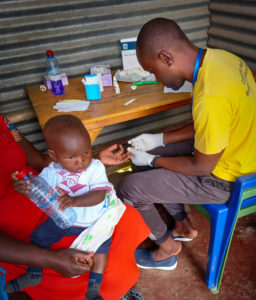 WiRED’s CME program is more than just tracking credits. It is about maintaining excellence in community health care. Just as licensed healthcare professionals must regularly update their knowledge and skills, our CHWs engage in ongoing training to provide high-quality, life-saving care on the front lines.
WiRED’s CME program is more than just tracking credits. It is about maintaining excellence in community health care. Just as licensed healthcare professionals must regularly update their knowledge and skills, our CHWs engage in ongoing training to provide high-quality, life-saving care on the front lines.
WiRED’s CME tracker will further expand the training and reach of CHWs everywhere to step up and fill the gap during a critical time globally when medical professionals and medical funding are in short supply.
Invitation to All CHWs Worldwide!
WiRED’s cost-free, accessible CME program is a step toward closing the global gap in healthcare education while also addressing the critical shortage of trained healthcare personnel in low-resource communities.
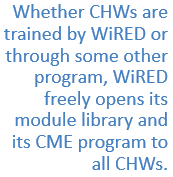 WiRED offers a rigorous, professionally developed, World Health Organization compliant CHW Basic Training curriculum. Whether CHWs are trained by WiRED or through some other program, WiRED freely opens its module library and its CME program to all CHWs. The process is simple and free for CHWs:
WiRED offers a rigorous, professionally developed, World Health Organization compliant CHW Basic Training curriculum. Whether CHWs are trained by WiRED or through some other program, WiRED freely opens its module library and its CME program to all CHWs. The process is simple and free for CHWs:
- Download HealthMAP to your phone here,
- Browse the library collection,
- Sign up on the app for a personal account and begin learning and
- Store your exam scores from each module in your personal, password-protected account.
Why Is There a Need for CHWs?
The World Health Organization (WHO) offers compelling evidence that CHWs play a vital role in addressing major health issues confronting communities around the world. In underserved regions worldwide doctors are scarce and health systems are inadequate to cope with a population’s day-to-day health, much less a disease epidemic.
WiRED provides a rigorous basic training curriculum for CHW certification, but that is only the first step in overcoming the global shortage of trained medical personnel to address health in low-income regions. To ensure continued excellence, WiRED created a CME program for CHWs, modeled after the rigorous standards followed by healthcare professionals worldwide.
Dr. Sean Bristol-Lee
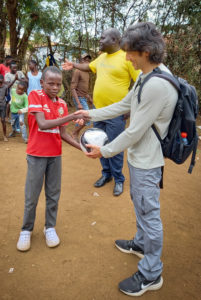
Dr. Bristol-Lee served as lead developer of the newly revamped HealthMAP. His team included WiRED board member Christopher Spirito (who developed the first generation HealthMAP in 2018) and WiRED’s information technology specialist, Matt Lang.
Driven by a passion for serving underserved communities, Sean pursued a doctorate in physical therapy studies at the University of California San Francisco. During his time at the university, he developed a keen interest in programming, leading him to combine his healthcare commitment with technology by creating mobile and web apps for health education in low-resource regions.


